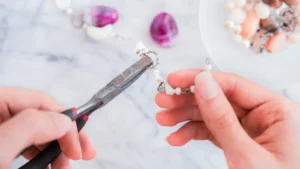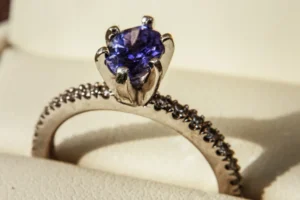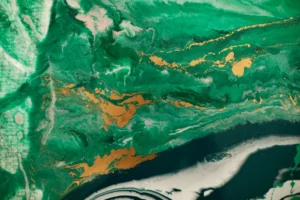Have you ever found yourself rushing into the shower, only to realise you’re still wearing your favourite gemstone necklace—and then paused, wondering, “Is this safe?”
It’s a small moment, but one that matters more than you might think. As someone who has worked closely with gemstone jewellers and spent years collecting crystals for personal use, I can tell you: this isn’t just about preserving beauty—it’s about protecting the very energy and meaning behind your stones.
Whether you’re wearing an heirloom sapphire pendant or a healing amethyst bracelet, understanding how water, heat, and chemicals affect gemstones can save you from costly mistakes—and heartbreak.
Let’s dive deep (pun intended) into whether you can safely wear gemstones in the shower—and what you should know before risking it.
Why It Matters: Beyond Just Looks
Most people assume gemstones are as tough as they look. After all, aren’t they formed under intense pressure deep within the Earth?
True—but that doesn’t mean they’re invincible.
Each gemstone has a unique chemical composition and internal structure. Water exposure, temperature changes, and soap residues can cause:
- Surface erosion
- Loss of lustre
- Discolouration
- Weakened settings and cracks
And if you believe in the energetic properties of stones, there’s more: some crystal healers argue that constant water exposure can “drain” a gemstone’s vibrational energy over time.
💬 Sarah Leighton, a certified gemologist at the Gemological Institute of America (GIA), explains: “Many people don’t realise that common household water, with its minerals and chemicals, can gradually degrade the appearance and stability of even the hardest gemstones.”
So, Can You Wear Gemstones in the Shower?
Short Answer: It Depends.
Let’s break it down by gemstone type because not all stones are created equal.
Gemstones You Should Never Wear in the Shower
Some gemstones are porous, soft, or chemically sensitive—and they’re especially vulnerable to water, soap, and shampoo.
| Gemstone | Why It’s a Bad Idea |
|---|---|
| Opal | Highly porous; absorbs water, leading to cracks and cloudiness. |
| Turquoise | Porous and easily discoloured by soaps and minerals. |
| Malachite | Reacts badly to moisture and chemicals; can even become toxic when damaged. |
| Lapis Lazuli | Porous surface; loses polish and vibrancy with water exposure. |
| Pearl | Organic, delicate, and easily eroded by acids and soaps. |
👉 Personal Note:
I once made the mistake of wearing my turquoise ring into a hotel shower during a trip to Lisbon. It went from vibrant blue to a dull greenish-grey—no matter how much I cleaned it afterwards, it never fully recovered.
Gemstones That Are More Resistant (But Still Not Ideal)
Some harder, non-porous stones can tolerate brief water exposure—but they’re still better kept dry to preserve their sparkle and strength.
| Gemstone | Durability Rating (Mohs Scale) |
|---|---|
| Diamond | 10/10 – Extremely hard, but soaps can dull its shine. |
| Sapphire | 9/10 – Tough, but water minerals can create build-up. |
| Ruby | 9/10 – Durable but can loosen in settings over time. |
| Quartz (Amethyst, Citrine, etc.) | 7/10 – Resistant but can still collect grime. |
⚡ Real Insight:
According to a study published in The Journal of Gemmology, even robust stones like diamonds can lose up to 30% of their brilliance from soap scum accumulation if not cleaned properly.
Why Water Isn’t the Only Enemy
You might think it’s just about water. Sadly, it’s more complicated:
- Soap Scum: Dulls the surface and hides brilliance.
- Shampoo and Conditioner: Contain sulphates and silicones that leave residue.
- Temperature Swings: Hot showers can expand and contract settings, making stones loose.
- Hard Water: Mineral deposits can etch or cloud stone surfaces.
💬 Emily Rivers, a jewellery conservator in London, notes: “Inconsistent temperature changes in showers are one of the biggest silent killers for gemstone jewellery settings. Metals expand and contract invisibly, loosening prongs over time.”
How to Care for Your Gemstones Properly
If you treasure your gemstones, these habits will extend their life (and magic):
1. Remove Jewellery Before Showering
Simple yet effective. Get into the habit of taking off rings, bracelets, and necklaces before stepping into the water.
2. Store Them Safely
Keep gemstones in a dry, cushioned jewellery box. If they get wet accidentally, dry them thoroughly with a soft, lint-free cloth.
3. Clean Them Gently
- Use lukewarm water and mild soap.
- No ultrasonic cleaners unless a professional confirms it’s safe.
- Soft toothbrushes are ideal for cleaning crevices—gently!
4. Recharge Their Energy (If You’re Into Crystal Healing)
For those who believe in stone energies:
- Place your stones in moonlight overnight.
- Use sound cleansing or sage smudging instead of rinsing.
FAQs: Quick Answers You Might Be Looking For
Can I Wear My Engagement Ring in the Shower?
Technically, if it’s a diamond set securely, it can survive. But over time, water and soaps can dull the sparkle and weaken prongs. It’s safer to remove it.
Will Soap Damage My Gemstones?
Yes. Even gentle soaps can leave a residue that dulls colour and shine.
What About Gold and Silver Jewellery?
While the metals themselves are somewhat resistant, their gemstones (and the settings) are vulnerable.
Is There Any Waterproof Jewellery?
Some manufacturers offer waterproof resin-coated pieces—but genuine gemstones are not inherently waterproof.
Final Takeaways: Protect Your Gems, Protect Their Story
Your gemstones aren’t just beautiful objects; they often carry personal history, emotional meaning, and even spiritual energy. A careless shower might not shatter them immediately, but over time, even small exposures add up to lasting damage.
Practical Advice:
Always take a few seconds to remove your jewellery before showering—it’s a simple act that honours the craftsmanship, the stone’s natural beauty, and your own memories tied to them.
💬 Have you ever had a gemstone disaster story (or a victory)? I’d love to hear it—drop a comment below!
External References:
You may also want about the reason behind ancient chinese using jade.
If you want to read more such blogs then make sure to visit our homepage.




